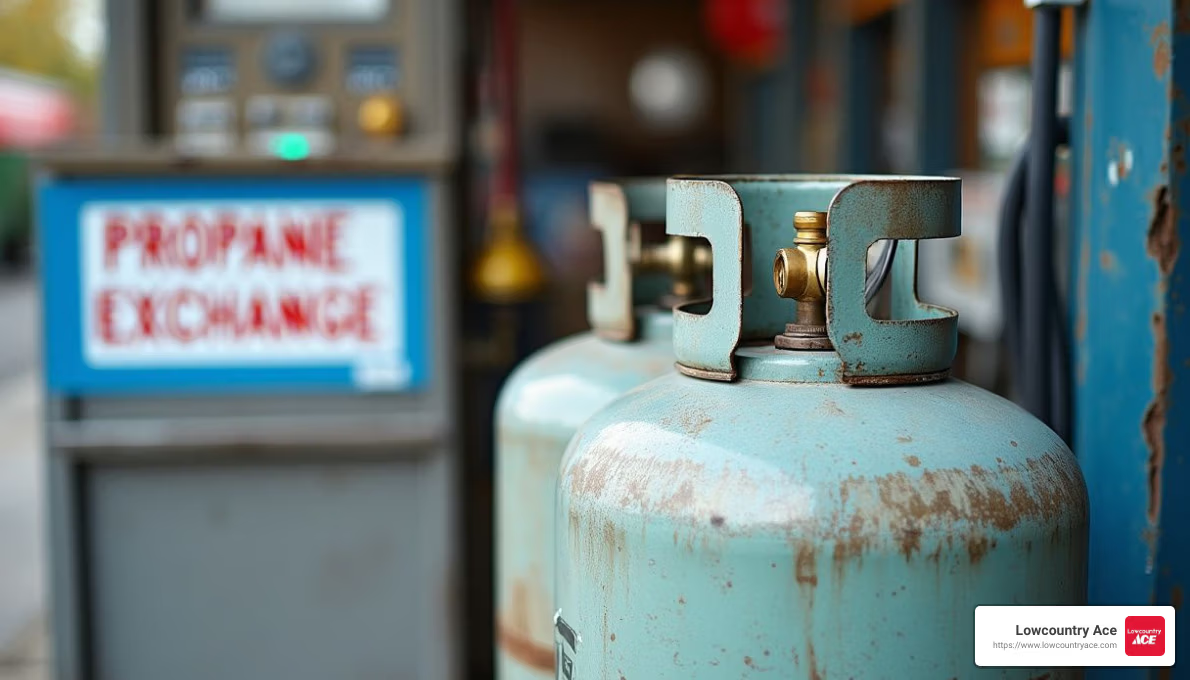Why Knowing How to Exchange Propane Tanks is Important
How do you exchange propane tanks? It’s a straightforward process, and here’s a quick summary to get you started:
- Find a Location: Look for a propane exchange station at hardware stores, gas stations, or grocery stores.
- Leave Your Empty Tank: Place your empty tank near the designated propane display.
- Pay the Cashier: Inform the cashier you want a propane exchange and complete the payment.
- Swap and Go: A store employee will provide a filled tank in exchange for your empty one.
Knowing how do you exchange propane tanks efficiently is crucial for maintaining the convenience of grilling, heating, and other applications that require propane. Exchanging propane tanks is a safe and quick solution, ensuring you’re never left without fuel when you need it.
By following these simple steps, you can enjoy the benefits of a full propane tank without any hassle. Exchanging is not only safe—since the tanks are pre-inspected—but also time-saving, letting you focus more on your outdoor activities and less on maintenance.
The helpful team at Lowcountry Ace Hardware is here to guide you through the process so you can keep your propane-powered appliances running smoothly.
How do you exchange propane tanks glossary:
– can you exchange propane tanks anywhere
– does home depot exchange propane tanks
– propane refills near me
How to Exchange Propane Tanks
Step-by-Step Guide
Exchanging a propane tank is simple and can be done in just a few steps. Here’s how do you exchange propane tanks efficiently:
-
Find a Location: Look for a propane exchange station at your local hardware store, gas station, or grocery store. Many places have 24/7 self-serve kiosks for added convenience.
-
Leave Your Empty Tank: Keep your empty tank in your vehicle until you complete the payment. This avoids safety issues inside the store.
-
Pay the Cashier: Inform the cashier you want to exchange a propane tank. Make your payment, typically between $15 and $25, depending on the location.
-
Swap and Go: A store employee will help you swap your empty tank for a filled one. Follow their instructions, place the new tank in your vehicle, and you’re good to go!
Safety Tips for Transporting Propane Tanks
Safety should always be your top priority when transporting propane tanks. Here are some essential tips to ensure you handle propane tanks safely:
-
Secure the Tank: Always transport and store the cylinder in a secure, upright position to prevent it from falling, shifting, or rolling.
-
Close the Valve: Ensure the cylinder valve is closed tightly. If required, seal it with a plug. Check with your propane retailer if a plug is necessary.
-
Ventilation is Key: Place the cylinder in a well-ventilated area of your vehicle. Never keep a filled cylinder inside a hot vehicle.
-
Direct Transport: Proceed directly to your destination and immediately remove the cylinder from your vehicle to avoid overheating.
-
Check for Leaks: Before using the tank, inspect for leaks by applying soapy water to the valve area. If bubbles form, there’s a leak.
By following these steps and safety tips, you can ensure a smooth and safe propane tank exchange. Proper handling and regular checks can prevent accidents and ensure your propane tank is always ready for use.
The next section will guide you on where to find propane exchange locations near you.
Where to Exchange Propane Tanks
Finding a propane exchange location near you is easier than you might think. Whether you’re at a gas station, hardware store, or convenience store, there are plenty of options available. Let’s break down how you can find these locations and the types of places that offer propane exchange services.
Finding a Propane Exchange Location Near You
To locate a propane exchange station nearby, you can use several methods:
- Store Locator: Many companies offer store locators on their websites. Simply enter your zip code, and you’ll get a list of nearby locations.
- Text Service: Some services allow you to find a location by texting a number. For instance, you can text FIND to 75653 for Blue Rhino locations.
- Ask the Helpful Team at Lowcountry Ace: They can guide you to the nearest propane exchange station and provide additional tips on safe handling and transport.
Types of Locations
Propane exchange services are widely available at various types of retailers. Here are some common places you can find them:
Gas Stations
Gas stations are a convenient option, especially if you need to exchange a tank outside regular business hours. Many gas stations have 24/7 self-serve kiosks, making it easy to grab a new tank at any time.
Hardware Stores
Local hardware stores, like Lowcountry Ace, provide personalized service and expert advice. They not only offer propane exchange but can also help you with related needs, such as grill maintenance and safety tips.
Convenience Stores
Convenience stores are perfect for a quick stop. While you pick up other essentials, you can also exchange your propane tank. This option is ideal for those who value time-saving and one-stop shopping.
Availability
Availability of propane exchange services varies by location, but here are some tips to ensure you find a spot:
- Check Online: Use online store locators or company websites to find the nearest location.
- Call Ahead: A quick phone call to the store can confirm if they offer propane exchange services.
- Look for Displays: Many stores have visible propane tank displays outside, making it easy to spot where you can exchange your tank.
By knowing where to look and what to expect, you can easily find a convenient propane exchange location that fits your needs.
Now that you know where to find propane exchange locations, let’s explore the benefits of exchanging versus refilling propane tanks.
Benefits of Exchanging vs. Refilling Propane Tanks
When it comes to managing your propane supply, you have two main options: exchanging your tank or refilling it. Both methods have their own set of benefits. Let’s break down the differences in cost, convenience, and safety to help you decide which option suits you best.
Cost Comparison
Refilling Your Tank:
– Cheaper in the Long Run: Refilling your propane tank is generally more economical. According to user experiences, refilling can cost around $16 for 20 lbs of propane, compared to $22 for a 15 lbs tank exchange at some big box stores.
– Pay for What You Use: When you refill, you only pay for the propane you need. This can be especially cost-effective if your tank isn’t completely empty.
Exchanging Your Tank:
– Fixed Price: The cost for exchanging a tank is usually higher than refilling. However, the price includes the convenience of a quick swap and a safety-inspected tank.
– Coupons and Deals: Some stores offer discounts or coupons, especially during peak grilling seasons. Always check for deals to save a few bucks.
Convenience Factors
Refilling Your Tank:
– More Steps Involved: Refilling often requires you to find a station that offers this service, which might not be as common as exchange locations.
– Time-Consuming: The process can take longer since you have to wait for the tank to be filled.
Exchanging Your Tank:
– Quick and Easy: Exchanging is usually faster. Just drop off your empty tank and pick up a full one. The whole process can be as quick as “drop, swap, and go.”
– Widely Available: Propane exchange services are available at numerous locations, including gas stations, hardware stores, and convenience stores. This makes it easier to find a spot nearby, even at odd hours.
Safety Considerations
Refilling Your Tank:
– Tank Condition: When you refill, you keep using your own tank. It’s essential to regularly check it for wear and tear.
– Expiration Date: Tanks need to be requalified or replaced every 10 to 12 years. If your tank is older, it might not be eligible for refilling.
Exchanging Your Tank:
– Inspected and Certified: Exchanged tanks undergo thorough safety checks for leaks, damage, and overall integrity. Companies ensure that the tanks meet industry standards.
– Peace of Mind: With an exchange, you know the tank you receive is safe to use, which adds an extra layer of security.
By understanding these benefits, you can make an informed decision whether to exchange or refill your propane tank. Next, let’s dive into some frequently asked questions to clear up any remaining doubts.
Frequently Asked Questions about Exchanging Propane Tanks
Can I Exchange a Propane Tank That is Expired?
Yes, you can exchange an expired propane tank. Propane tanks have a lifespan of about 12 years from the manufacture date. To check if your tank is expired, look for the date stamp on the collar of the tank. If your tank is past its expiration date, most propane exchange locations will allow you to exchange it for a new, filled tank. This is a convenient way to ensure you always have a safe and up-to-date tank.
What Brands of Propane Tanks Can Be Exchanged?
You can exchange different brands of propane tanks without any issues. Services offered by Lowcountry Ace provide brand acceptance and tank exchange flexibility, allowing you to bring in any brand of empty tank and exchange it for a full one. This makes it easy to always have a ready supply of propane, regardless of the original brand of your tank.
How Much Propane is in an Exchanged Tank?
A standard 20 lb propane tank, often used for grills, holds about 4.7 gallons of propane when full. This amount can vary slightly based on the tank’s condition and the temperature, as propane expands in heat. Knowing this can help you plan your grilling time and ensure you don’t run out of propane at the worst possible moment. For instance, a full 20 lb tank can typically provide around 18-20 hours of grilling time, depending on your grill’s BTU rating and usage.
By understanding these key points, you can make the process of exchanging propane tanks smooth and hassle-free. Next, let’s explore where you can exchange your propane tanks and the types of locations available.
Conclusion
Exchanging propane tanks is a simple, convenient, and safe way to ensure you always have a ready supply of propane for your grilling, heating, or other needs. By understanding the process and following safety tips, you can make your propane exchange experience smooth and hassle-free.
At Lowcountry Ace Hardware, we prioritize safety, value, and excellent customer service. Our team is here to help you with all your propane needs, from exchanging tanks to providing safety tips and answering any questions you may have.
Why Choose Lowcountry Ace?
- Safety First: Our team inspects every tank for leaks and damages before refilling, ensuring you get a safe and reliable tank.
- Great Value: We offer competitive prices and seasonal discounts, making propane exchange affordable.
- Exceptional Customer Service: Our knowledgeable staff is ready to assist you with any questions or concerns, making your experience seamless.
For more information on propane exchange and to find a location near you, visit our propane exchange service page.
Thank you for trusting Lowcountry Ace with your propane needs. We look forward to serving you and ensuring you have a safe and enjoyable experience.
Lowcountry Ace Hardware: Your one-stop shop for home improvement. We offer quality products from trusted brands and expert advice from our experienced staff. Located on James Island, visit us for tools, hardware, fishing gear, power tools, building materials, grills & smokers, electrical and plumbing supplies, and more.






